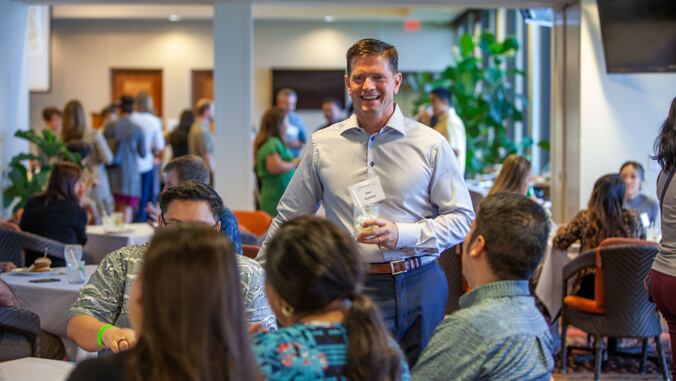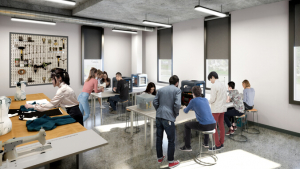
Ben Godsey knows how important entrepreneurs are to Hawaiʻi’s economy. As the president and CEO of ProService Hawaii, one of Hawaiʻi’s largest outsourced human resource providers, he counts more than 2,000 local small businesses as clients—most of them entrepreneurs.
That’s one of the reasons Godsey and his wife, Yvonne Chan, are investing in the University of Hawaiʻi’s Residences for Innovative Student Entrepreneurs (RISE) with a $250,000 gift for the live-work-study facility being built to encourage student entrepreneurs to dream big and turn those dreams into successful businesses.

“Hawaiʻi is run by small businesses—and small business is entrepreneurship, whether it’s a brand-new business, or it’s a business that’s been around for 50 or 100 years,” Godsey said. “Entrepreneurship and small business are at the heart of making Hawaiʻi a more livable place.”
The $70 million RISE project—expected to open fall 2023—is being built on the site of the former Atherton YMCA, across from the UH Mānoa campus, under a public-private partnership between the university, UH Foundation and Hunt Companies, with no taxpayer dollars spent. The RISE programs will be operated by the Pacific Asian Center for Entrepreneurship (PACE) at the UH Mānoa Shidler College of Business.
All RISE residents will be encouraged to participate in PACE programs, setting up the center to play a huge role in the success of the RISE facility, said Godsey, who is also chairman of the PACE board of directors.
“What’s exciting about the RISE project is that with the new building comes new opportunities for enhanced programs and greater learning and education,” he said. “It’s really going to be fantastic.”
Game-changing clean maker space

One unique aspect of RISE is that the 374 residents in the six-story, 114,000-square-foot RISE building will have access to PACE’s classroom and co-working spaces, meeting areas, maker spaces and prototyping labs with high-tech equipment, all without having to leave the building. The gift from Godsey and Chan will name the clean maker space at RISE, where students will be able to make and test their products.
“This project will truly be a game changer in the entrepreneurship community,” said Shidler and PACE alumna Rose Wong, founder and owner of Kolohe, a Hawaiʻi brand that specializes in a Custom Jewelry Bar at its store locations. “A facility like this would have definitely accelerated my business even more.”
The RISE space will be ideal for student entrepreneurs like Wong, who started her business in high school at age 16 and worked to grow it through the PACE program while a student at UH. Kolohe today has two stores in Waikīkī and a successful e-commerce website.
“The impact that this facility will have on future students is going to be tremendous,” she said. “Encouraging entrepreneurship and creative solutions to today’s workplace environment is going to have a positive effect on the community in many different ways.”
A self-sustaining vision
Read more about the UH Mānoa RISE center.
To apply, visit the RISE website.
More than $3.7 million has been raised to date for the project, funds that will furnish and equip the building and provide for initial operations and scholarships. In addition to Godsey and Chan, similar gifts have been made by Rich and Eileen Wacker, Hawaiian Electric Industries, American Savings Bank, Island Insurance Foundation, First Hawaiian Bank and Walter A. Dods Jr.
“By fundraising for this, we have the opportunity to enhance the programming in the facility as part of its launch,” Godsey said. “I think it’s going to be a huge home run. It’s going to be transformative for the university and for the community and it’s going to become a real cornerstone that we can take great pride in, and will attract people to UH who will become entrepreneurs and support our community.”

